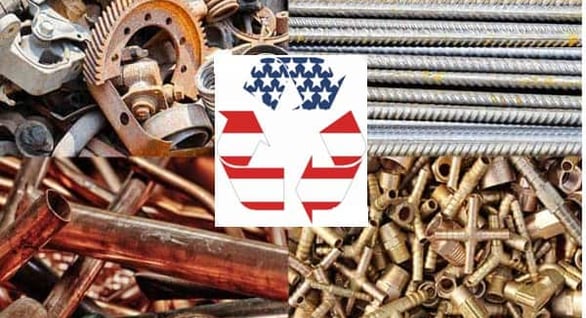Turning Trash into Cash: Exploring the Economic Opportunities of Scrap Yards Near Me In My Area
Scrap yards play a crucial role in turning trash into cash
7/24/20236 min read


Featured Company
Related Posts
Contact Us
Overview of Scrap Yards and Their Significance
Introduction
Have you ever wondered what happens to all the items we throw away? From old appliances to discarded metal and plastic, our waste has the potential to become a valuable resource. Scrap yards, also known as junkyards or salvage yards, play a crucial role in recycling and waste management by collecting and processing these materials. In this blog post, we will explore the economic opportunities that scrap yards offer, both for individuals and businesses, as well as their importance in creating a more sustainable future.
The Link Between Recycling and Economic Opportunities
Recycling has long been recognized as an essential practice for environmental sustainability. However, it is often overlooked that recycling can also present significant economic opportunities. By diverting waste from landfills and repurposing materials, scrap yards contribute to the circular economy, where resources are reused and recycled, creating a closed-loop system.
This circular economy approach not only reduces the extraction of raw materials but also helps to conserve energy and reduce greenhouse gas emissions. Additionally, the economic benefits of recycling through scrap yards can be seen in job creation, revenue generation, and cost savings for businesses. By understanding the link between recycling and economic opportunities, we can unlock the full potential of scrap yards in our community.
The Importance of Scrap Yards
Discuss the Role of Scrap Yards in Waste Management
Scrap yards play a vital role in waste management by acting as collection points for various types of recyclable materials. They provide a convenient location for individuals and businesses to bring their unwanted items, ensuring that these materials are properly handled and processed. Without scrap yards, much of this waste would end up in landfills, contributing to environmental degradation and the depletion of natural resources.
Scrap yards also serve as intermediaries between waste producers and recycling facilities. They sort, process, and prepare materials for recycling, making it easier and more cost-effective for recycling facilities to obtain the raw materials they need. The efficient operation of scrap yards helps to streamline the recycling process and ensure that valuable resources are not wasted.
Environmental Benefits of Recycling Through Scrap Yards
One of the most significant advantages of recycling through scrap yards near me and its members is the positive impact it has on the environment. By diverting materials from landfills, scrap yards help to reduce the amount of waste that decomposes and releases harmful greenhouse gases. This, in turn, helps to mitigate climate change and improve air quality.
In addition to reducing greenhouse gas emissions, recycling also conserves energy and reduces the need for raw material extraction. For example, recycling aluminum requires only 5% of the energy needed to produce new aluminum from bauxite ore. By recycling materials like aluminum, steel, and copper, scrap yards contribute to resource conservation and help mitigate the environmental impact of mining and manufacturing.
Types of Materials Accepted at Scrap Yards
Categorize Common Materials Accepted
Scrap yards accept a wide range of materials, each with its own value and potential for profit. Common materials accepted at scrap yards include:
Metal: Aluminum, copper, brass, steel, and iron are highly sought after due to their recyclability and value in various industries.
Electronics: Old computers, cell phones, and other electronic devices contain valuable metals and components that can be recovered and reused.
Plastic: Certain types of plastic, such as high-density polyethylene (HDPE) and polyethylene terephthalate (PET), can be recycled and turned into new products.
Paper: Scrap yards often accept paper and cardboard, which can be processed into new paper products.
Glass: Glass bottles and jars can be recycled and transformed into new glass products.
Highlight the Value and Profitability of Each Material
The value and profitability of each material vary depending on factors such as market demand, quality, and quantity. Metals, especially precious metals like gold and silver, tend to have high value and can fetch a good price at scrap yards. Electronics, although more challenging to process, can yield valuable components and metals, making them a potentially lucrative source of income.
Plastic, paper, and glass also have value, with prices varying depending on the type and quality of the material. While the monetary value of these materials may be lower compared to metals, their recycling still contributes to environmental sustainability and waste reduction.
Economic Opportunities for Individuals
How Individuals Can Profit from Recycling Materials at Scrap Yards
Individuals can profit from recycling materials at scrap yards by collecting and selling recyclable items. This can be as simple as collecting aluminum cans, copper wire, or old appliances and bringing them to a scrap yard for recycling. By doing so, individuals not only earn money but also contribute to reducing waste and conserving resources.
Moreover, individuals can explore creative ways to repurpose items that might otherwise be discarded. Upcycling, the process of transforming old or unwanted materials into new products, has gained popularity in recent years. By upcycling materials and selling finished products, individuals can tap into the growing market for sustainable and unique goods.
Potential for Job Creation through Scrap Yard Operations
Scrap yards have the potential to create employment opportunities within the community. From administrative and managerial roles to sorting and processing positions, scrap yard operations require a diverse range of skills and expertise. By establishing and expanding scrap yard businesses, entrepreneurs can contribute to job creation and economic growth in the local area.
Furthermore, the economic ripple effect of scrap yard operations extends beyond the yard itself. Recycling materials collected at scrap yards also supports the recycling industry as a whole, which creates additional jobs in recycling facilities, manufacturing plants, and related sectors. By supporting the growth of scrap yards, individuals can contribute to job creation at various stages of the recycling process.
Economic Opportunities for Businesses
Discussion on How Businesses Can Capitalize on Scrap Yards:
Businesses can capitalize on scrap yards in several ways. Firstly, businesses can optimize their waste management practices by partnering with scrap yards to recycle their waste materials. This not only helps reduce disposal costs but also enhances the company's environmental reputation and sustainability initiatives.
Additionally, businesses can source recycled materials from scrap yards to incorporate into their production processes. By using recycled materials, businesses can reduce their reliance on virgin resources, lower their production costs, and appeal to environmentally conscious consumers. This creates a win-win situation, where businesses benefit economically while contributing to a more sustainable future.
Case Studies of Successful Businesses Utilizing Scrap Yard Materials
Several businesses have successfully capitalized on scrap yard materials, demonstrating the economic viability of incorporating recycled materials into their operations. For example, a furniture manufacturer may use reclaimed wood from demolished buildings, reducing the need for new timber and giving their products a unique and eco-friendly appeal.
Another example is the automotive industry, where manufacturers use recycled steel and aluminum to create car parts. By incorporating recycled materials, these businesses not only reduce their environmental impact but also benefit from cost savings and improved resource efficiency.
Challenges and Solutions in Scrap Yard Operations
Address Common Challenges Faced in Scrap Yard Businesses
Like any industry, scrap yard businesses face their own set of challenges. These may include fluctuating market prices, changes in regulations, and competition from other recycling options. However, proactive measures can be taken to mitigate these challenges.
For instance, scrap yard operators can stay informed about market trends and adjust their pricing strategies accordingly. They can also actively engage with local policymakers and industry associations to advocate for favorable regulations and policies that support the growth of the recycling industry.
Suggested Solutions for Common Challenges
One potential solution for overcoming challenges in scrap yard operations is diversification. By expanding the range of materials accepted and exploring new markets, scrap yards near me and its clients do adapt to changing conditions and maintain profitability.
Investing in technology and automation can also help improve operational efficiency and reduce costs. Implementing advanced sorting and processing equipment can streamline operations, increase productivity, and enhance the quality of recycled materials.
Furthermore, collaboration and partnerships with scrap yards near me within the recycling industry can offer mutual benefits. By working together, scrap yards can share resources, expertise, and market opportunities, creating a more resilient and sustainable recycling ecosystem.
Conclusion
Scrap yards near me and their locations play a crucial role in turning trash into cash by recycling and repurposing materials that would otherwise end up in landfills. Not only do they contribute to waste management and environmental sustainability, but they also offer significant economic opportunities for individuals and businesses. By recognizing the value of recycling through scrap yards and addressing the challenges faced in their operations, we can unlock the full potential of these facilities and create a more sustainable and prosperous future for all.
For immediate assistance please Contact us today to experience the Junk Yard difference.
Service Locations:
Copyright 2024: Scrap Yard Near Me - All Rights Reserved
Powered By: Digital Intent Marketing





